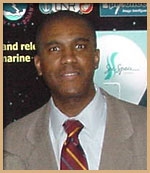 Mr. James Harrington, Jr. is Manager of the Minority University Space Interdisciplinary Network (MU-SPIN). MU-SPIN is a NASA outreach program targeting increased participation of representatives from minority educational insitutions in NASA missions. The program constitutes a major networking and
education initiative for minority institutions, and other universities with large minority student enrollments.
Connecting these institutions with the NASA Science
Network, and promoting the activities such connections
provide serve as primary goal of the program. Mr. James Harrington, Jr. is Manager of the Minority University Space Interdisciplinary Network (MU-SPIN). MU-SPIN is a NASA outreach program targeting increased participation of representatives from minority educational insitutions in NASA missions. The program constitutes a major networking and
education initiative for minority institutions, and other universities with large minority student enrollments.
Connecting these institutions with the NASA Science
Network, and promoting the activities such connections
provide serve as primary goal of the program.
NASA MU-Spin |
